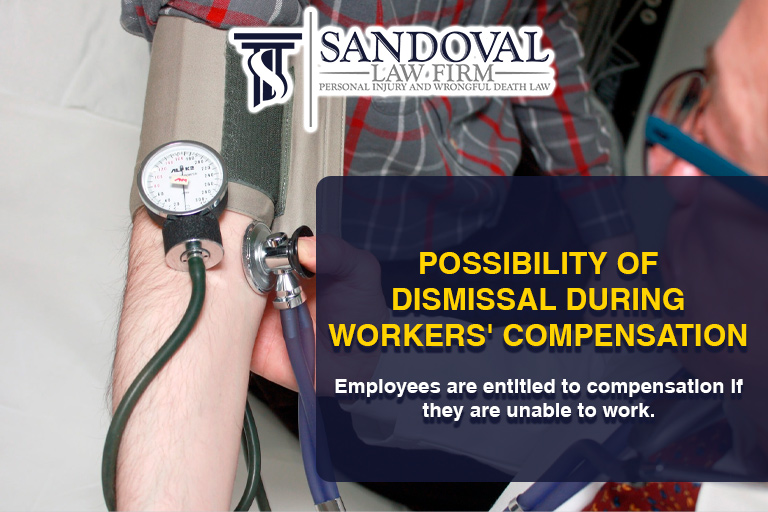After suffering an injury at work employees are entitled to receiving compensation if they are unable to work. Any employee that is allowed to go back to work with certain restrictions can still receive partial wage loss benefits if the salary is lower after returning to work. However, if a person gets fired from their job, all of their income loss benefits will be terminated. As a result of this factor, employers sometimes terminate the employment of a person during their recovery.
While employers tend to fire a person after they return to work from an injury, employers are not allowed to terminate a person’s employment after a work injury. An employer is not allowed to fire an employee who makes a claim for worker’s compensation. They cannot fire a person because of a disability either. Employers are prohibited from firing a person from their job if the disability affected one’s ability to perform the job and whenever they are on restricted duty. However, an employee can be fired for cause. Whenever you work for a company in Texas and receive worker’s compensation, it is important to make sure that your employer complies with all of the work restrictions that are made by your physician. They must not force you to do work that is impossible to do with your current condition. It is, therefore, very important to understand your rights as an employee and protect your job security. Working with a Texas worker’s compensation lawyer at Sandoval Law Firm can help those who need legal assistance.
The state of Texas is an at will employment state where an employee can be fired for any reason or for no reason at all. While an employee can be fired for any reason or none at all, there are some restrictions to this general rule. The worker’s compensation laws in the state prohibit an employer from firing you because you made a claim for workers compensation because they are looking to avoid paying you any benefits. This provision in the law was established by the American with Disabilities Act. The federal law applies in the state of Texas and prevents employers form firing an employee because of any medical condition that results in disability.
A person that is unable to work due to suffering an injury will need to be paid income benefits from the employer’s insurance carrier. At the same time, an employee cannot be fired due to their inability to work. An employee that is put on restricted duty can be put on a light duty position while they recover from their injuries. If the employee doesn’t accept the light duty position, then the benefits can be reduced based on what is normally paid for that particular work.
If an employee accepts the position, the employer needs to understand the limitations of the employee and follow the instructions made by a physician. Whenever an employee attempts to make an employee perform tasks that are not compatible with their medical condition, they cannot terminate person’s employment. However, if the employee’s job performance is below average, then the employer can argue that they made the termination for cause. Due to the risk of this scenario, it is important for an employee to make sure that their physician makes it very clear what the employee can do at their job and what they are unable to due based on their current health condition and when taking a light duty job.
Whenever an employee is fired after an injury on the job or if they had their employment terminated after filing worker’s compensation, the employer can be liable for unlawful termination. After a person suffers a work-related injury, the relationship between both the employer and the employee can become contentious. In many cases, the employer believes that the employee is falsely making an injury claim in order to get certain benefits. An employer may also believe that this false injury can prevent them from reaching their goals while the injured employee is not working. During this scenario, the employer will often retaliate by making a wrongful termination of an employee who is really injured.
Anytime an employee is terminated from employment in Texas, it is important that they know what constitutes unlawful retaliation for a work-related injury. Employers are prohibited from discriminating or retaliating against an employee for the following reasons:
- The employee made a claim for worker’s compensation in good faith
- An employee consulted with a lawyer to represent them for the claim
- Filed a worker’s compensation claim against the employer’s insurance company
- Testified or plans to testify in any administrative proceeding about the worker’s compensation claim
If an employee believes that they have been victim of an unlawful retaliation or wrongful termination from an employer, there are a number of things that they can do. These things can allow the employee to get the compensation they need and maintain their quality of life while they recover from their injuries.
The first step is to fill out a questionnaire issued by a lawyer who specializes in worker’s compensation cases. Fortunately for employees, there are numerous benefits for filing a claim for unlawful retaliation. Since this type of case is a part of civil tort law, successful retaliation cases can result in a number of favorable outcomes for the employee.
- Reimbursed for wages lost
- Reimbursed for wages that will be earned in the future
- A considerable amount of punitive damages against the employer
- A court ordered reinstatement of employment at the employee’s former position
If you’ve been injured on the job and don’t know whether you are entitled to benefits under Texas Worker’s Compensation or, whether your employer is a Texas Non-Subscriber with an Employee Injury Benefit Plan, call Houston Work Injury Attorney Hector L. Sandoval and get the representation that you deserve! Sandoval Law Firm, PLLC helps injured workers. Call (346) 347-7777 for a free and informative consultation!














